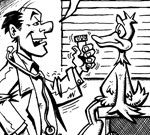The Connection Between Vitamin D and Autism Prevention
| Share on Facebook | Share on Twitter | Share on Google+ |
Vitamin D and autism have a significant but not critical relationship. Autism is an extraordinarily complex disease that defies easy treatments. There is no single substance that always heals autism, and there is no single substance that always causes autism.
Preventing vitamin D insufficiency is one more part of autism care. Fortunately, it is an easy part of autism care. And taking care of vitamin D insufficiency while the child is still in the womb may even help prevent the condition from ever occurring.
Vitamin D and Autism Prevention
About the year 2000 autism researchers noticed that children who were born in the spring and early summer were more likely to be autistic than children who were born in autumn and the early winter. They also noticed that mothers who had more colds and flu while they were pregnant also were more likely to have children who had autism. And then scientists found that pregnant women with lower levels of vitamin D had more colds and flu.
Of course, that could just mean that women who live in sunny climates get more sun so their bodies make more vitamin D and they catch fewer colds because of the nice weather. However, scientists also observed that women who consume cod liver oil, which is extremely rich in vitamin D, are much less likely to have autistic offspring. Vitamin D, it appears, can stop autism. But why?
Inflammation Is the Connection Between Vitamin D and Autism
The answer seems to be inflammation. When a pregnant woman catches an infection, her immune system makes inflammatory substances to kill infected cells and infectious microbes and viruses. Those inflammatory substances can inflame the unborn baby's brain and set off changes that lead to autism.
Vitamin D, on the other hand, reduces the inflammatory reaction in the brain of the developing fetus. The anti-inflammatory effect is much greater, however, in the presence of estrogen than in the presence of testosterone. That may be the reason so many more boys are born with autism than girls.
Will taking vitamin D during pregnancy guarantee no child will be born with autism? Probably not. However, it is more one layer of protection for the health of the child. Up to 4,000 IU a day is recommended for all expectant mothers. But can vitamin D treat autism in the already-born as well as the unborn?
Can Vitamin D Treat Autism in Children?
There have been a few cases of children with autism improving after they received vitamin D supplements. There have also been cases in which the child improved after vitamin-deficient parents received vitamin D.
Sometimes it is the parents who need the vitamin because they spend so much of their time indoors, trying to earn a living, dealing with their child, that they become vitamin D deficient. The resulting loss of mental clarity has an impact on how easily they can deal with the challenges of raising an autistic child.
Autistic children who are most likely to benefit from supplemental vitamin D (1,000 IU a day is a safe and recommended dose) are those who behavior becomes especially difficult during the winter, and autistic children of African, Asian, Middle Eastern, Hispanic, or Mediterranean descent. Darker skins make less vitamin D.
Children who have ADHD usually have hormonal issues that keep their bodies from using vitamin D, but children who have autism often have a correctable vitamin D deficiency for which treatment may work minor miracles. And the cost of supplementation is just pennies a day.
Selected Reference:
Cannell JJ. Autism and vitamin D. Med Hypotheses. 2008;70(4):750-9. Epub 2007 Oct 24
-
Skin CareMen Skin Care
-
Free ResourcesFree eBooks
-
The... patient should be made to understand that he or she must take charge of his own life. Don't take your body to the doctor as if he were a repair shop.Quentin Regestein
-
Featured Health Supplement
 If you find a product that is as effective as Total Balance, and is better value for money, let us know and we will give you a refund equivalent to your entire purchases of Total Balance…retrospective.
If you find a product that is as effective as Total Balance, and is better value for money, let us know and we will give you a refund equivalent to your entire purchases of Total Balance…retrospective.
-



















